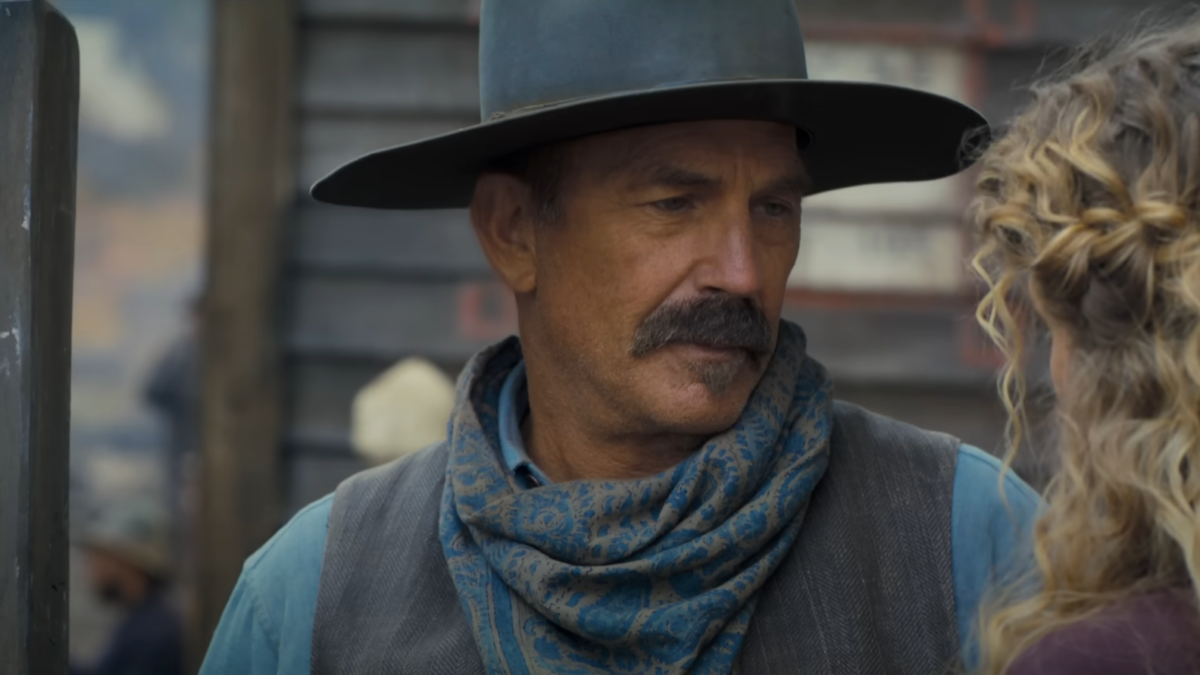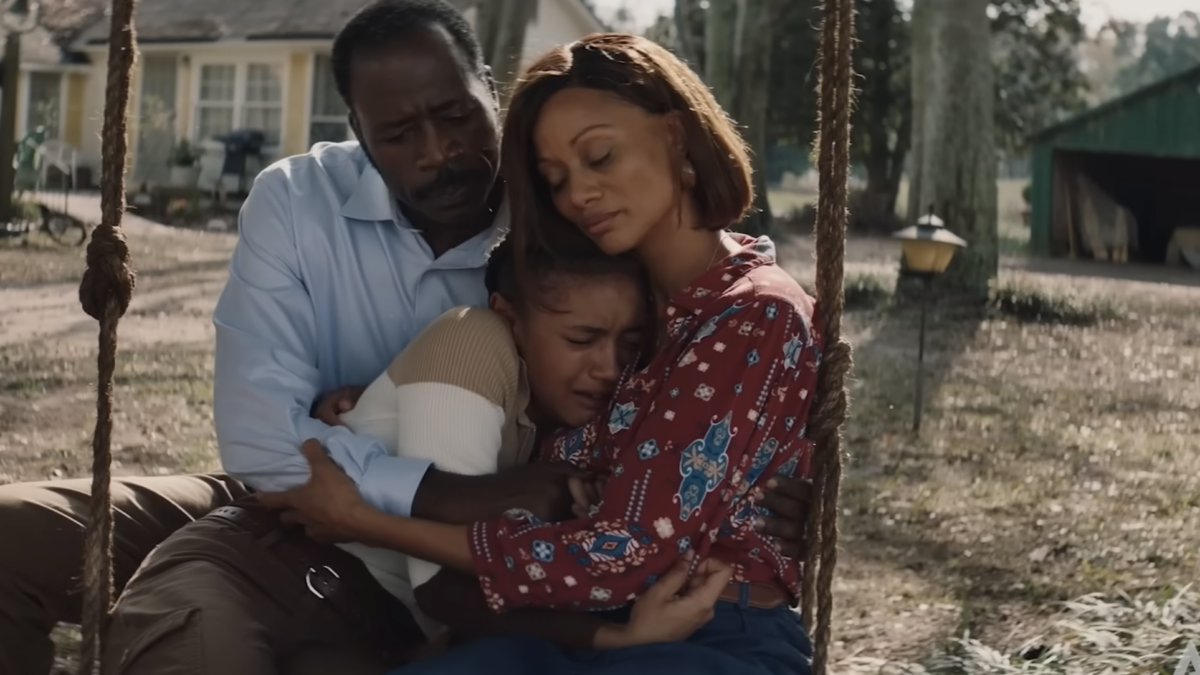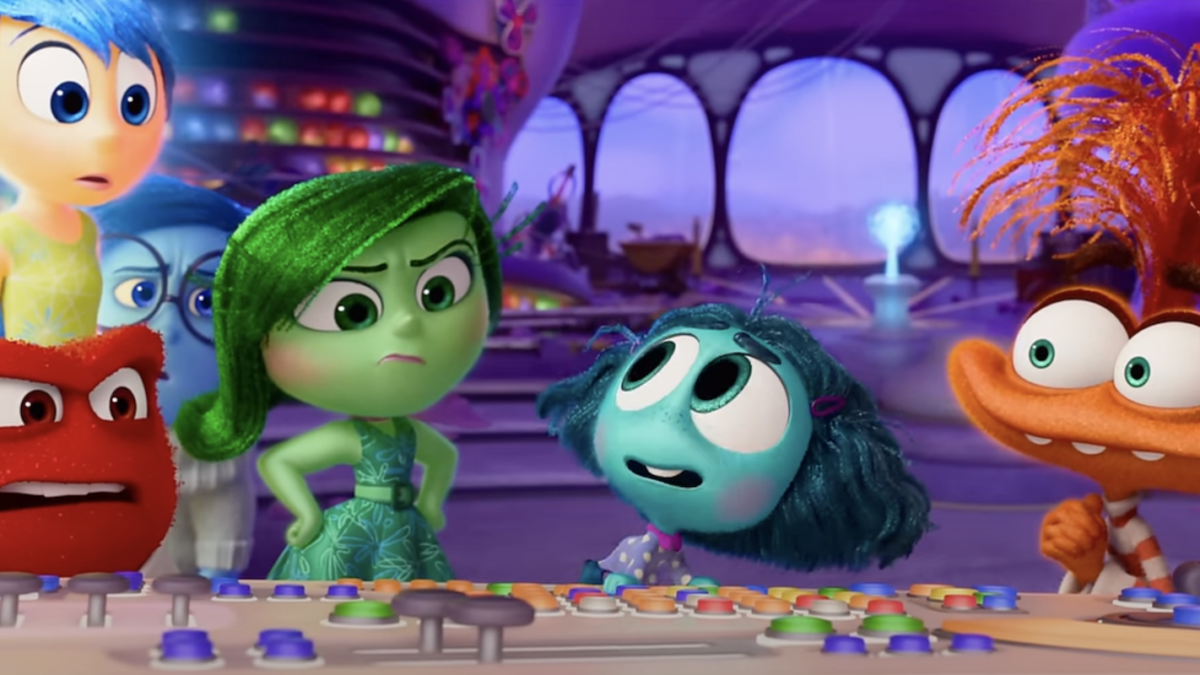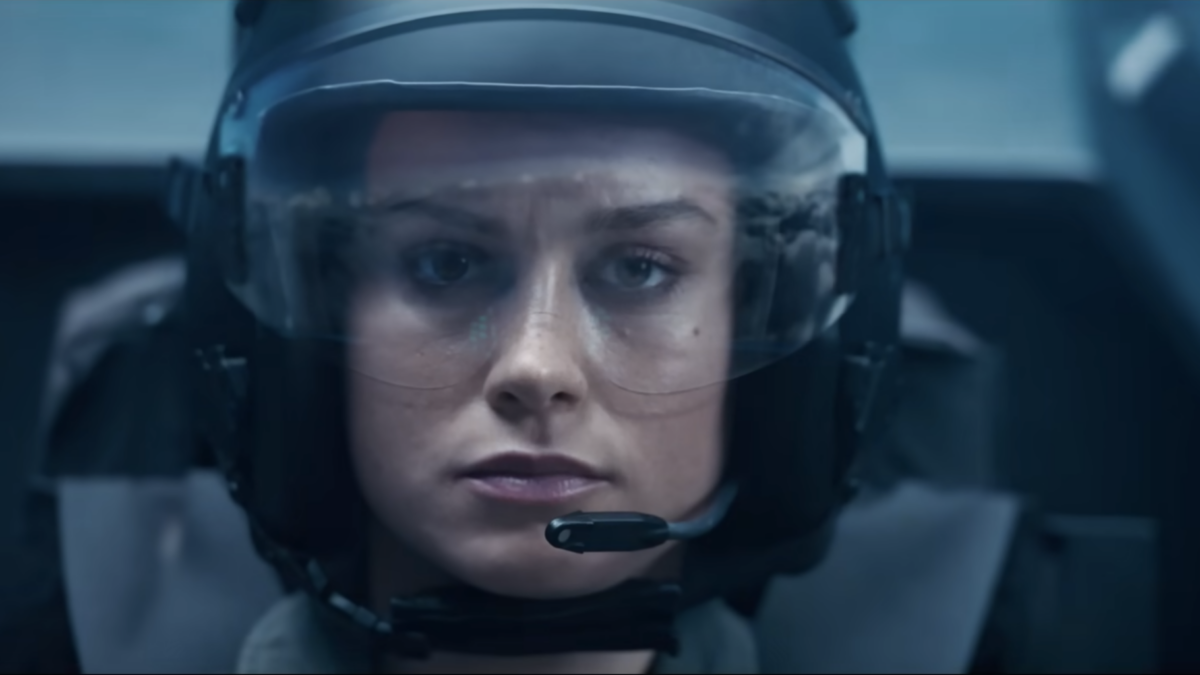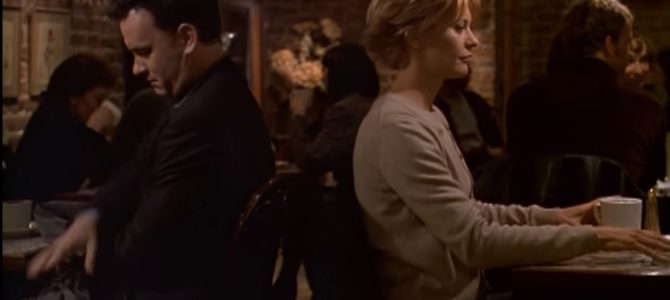
“You’ve Got Mail” began streaming on Amazon Prime September 30, and remains on the Roku Channel (yay!). As far as movies go, the 1990s boasted some memorable blockbusters—“Pulp Fiction,” “Titanic,” and “Forrest Gump,” to name a few. “You’ve Got Mail,” billed as a simple romantic comedy, was also released in that period, although it earned much less fanfare and revenue.
However, since then it’s become a cult classic rom-com: Simple and charming on its surface, yet underneath full of complexity and depth. Here are five reasons you should stream it on your next movie night.
1. “You’ve Got Mail” was the first romantic comedy to really feature the good, the bad, and the ugly of the Internet.
An updated version of the old film “The Shop Around the Corner,” in “You’ve Got Mail” business owners and book lovers Kathleen Kelly, played by Meg Ryan, and Joe Fox, played by Tom Hanks, strike up an online friendship. In real life, unbeknownst to each other, Kelly is the owner of a small bookstore, which Joe inadvertently puts out of business after building the bookstore version of Walmart (i.e., Barnes and Noble).
You can tell the movie was released in the nineties (1998), when the Internet was still a baby, because every time Joe and Kathleen log online to talk, they actually dial up and you hear that kewwwwshhhhhrrruuuuu sound. Remember that? And the AOL host says those “magical” words (“You’ve got mail!”) Joe and Kathleen depend on for their blossoming relationship.
At first they both love talking online. Sure, it’s slow and it doesn’t exactly provide the best foundation for a relationship, but not knowing who each other really is, as Joe says, “has its charms.”
Now we chat on Facebook Messenger, Instagram, and Twitter. Those mediums have provided a connectedness Kathleen and Joe would have loved. (Joe would have some fantastic things to say via Twitter, no doubt.) Without the Internet, these two wouldn’t have chatted, and with it, many of us accomplish daily what we never thought possible. All hail the mysterious, but incredible, Interwebs.
That said, the Internet has its downsides, of course, as the two businesspeople find out. Online they appear friendly, inquisitive, and charming. In their real, messy lives, neither loves the person he or she is quasi-committed to, both are passionate yet torn about their vocation selling books, and both would like to possess personal qualities the other person has that seem valuable but foreign. After time passes, they even realize they might be falling in love with the idea of each other rather than each other.
This is especially apparent when Joe’s wingman, played by Dave Chapelle, tells Joe he sees her waiting for him in a coffee shop and Joe can’t bear to show up as the anonymous friend because she knows him to be the “big, bad F-O-X.”
The Internet can be a rabbit hole in the truest sense: You can open window after window and find out what you’re looking for or who you’re looking for isn’t even real or satiating. This was true for Kathleen and Joe until they really met, and it’s even truer for us now, since it seems like everyone spends so much of their time online being someone they’re not or looking for something they can’t have.
2. “You’ve Got Mail” celebrates good literature while being a great film.
I suppose another film critic might chide the late director and screenwriter Nora Ephron for the story’s parallels to Elizabeth Bennett and Mr. Darcy, the main characters of “Pride and Prejudice,” calling the comparisons too trite and even prosaic. Bennett is prejudice and Darcy is prideful; likewise Kathleen and Joe. However, as a lover of 19th century British literature, I adored this similarity.
On top of mentioning the book often, the two sell books for a living, in New York City at that. If there isn’t a more magical and heart-palpitating combination for literature lovers—New York City, bookstores, Jane Austen, and bouquets of sharpened pencils—I don’t know one. What book lover can’t relate to Kathleen’s realization that “So much of life reminds me of something I read in a book, when shouldn’t it be the other way around?”
The themes of classic literature are so complex and timeless, books like “Pride and Prejudice” always read as exciting, interesting, and thought-provoking no matter the year. As much as I want my children to love learning and reading, I also don’t want them to just read anything they can find in children’s or young adult literature.
Some of those works are poorly written, the characters are one-dimensional, and plots are weak. I know many of them sell well, but so did “50 Shades of Grey.” Quantity doesn’t always equal quality. Literature that stands the test of time teaches lessons for all ages, even when it’s in movies.
3. “You’ve Got Mail” values friendship, then love, over hookups.
When this movie was released, meeting online was the new frontier, but now it’s not nearly as foreign. USA Today reports more than one-third of new marriages today begin online. Still, their online relationship aside, the two main characters actually hate each other before their romance blooms. To confuse matters more, they’re friends before lovers.
After the meet-cute, Joe and Kathleen discover warring business interests and have a few sour encounters. But once Joe realizes the charming girl he’s been talking to online and the attractive, feisty, bookstore owner he happens to be putting out of business is the same person, he can’t help himself: An old-fashioned boy-meets-girl pursuit ensues.
Joe has the home court advantage and uses every strategy in the play book. He brings her daisies, “the friendliest flower,” reads her favorite book, and “bumps” into her at her favorite West Side hangouts. In essence: he woos her. Call me old-fashioned or anti-feminist, but I dare say most women—even today!—are wired to enjoy, appreciate, and fall in love with a man who courageously, deftly, and respectfully leads a woman to his heart and home.
It isn’t exactly love at first sight, or first hookup, as it is in so many movies or college campuses today. Instead, they gradually foster a comfortable friendship. The deal is sealed, not when their true identities are revealed for the first time, but when he asks her, just outside her adorable, undeniably expensive New York City brownstone, to forgive him for this “tiny little thing of putting you out of business.” If she would, he would ask immediately: “How about coffee, drinks, dinner, a movie…for as long as we both shall live?”
I don’t know what happens to fictional Kathleen and Joe, but isn’t friendship and forgiveness really the hallmark of a real-life lasting relationship? There you can find common ground on everything from the Internet to literature, and maybe even agree on a few inspiring and encouraging movies to watch together.
4. “You’ve Got Mail” featured the work of the great Nora Ephron.
Nora Ephron was an essayist, novelist, and director. She directed “You’ve Got Mail,” but was perhaps better known for writing “When Harry Met Sally” and for writing and directing “Sleepless in Seattle” (you see a theme here) and the adorable foodie love story “Julie and Julia.” Nominated for several Academy Awards for Best Writing, Ephron was the epitome of talent, wit, grace, and humor.
Ephron died in 2012 from pneumonia brought on by acute myeloid leukemia. Married briefly to journalism legend Carl Berstein, her New York Times obituary celebrated her unique way of writing about everyday things in an extraordinary way.
‘Everything is copy,’ her mother once said, and she and her husband proved it by turning the college-age Nora into a character in a play, later a movie, ‘Take Her, She’s Mine.’ The lesson was not lost on Ms. Ephron, who seldom wrote about her own children but could make sparkling copy out of almost anything else: the wrinkles on her neck, her apartment, cabbage strudel, Teflon pans and the tastelessness of egg-white omelets.
The obituary observed that Ephron had a gift for writing and directing about “romantic comedy and for delayed but happy endings that reconcile couples who are clearly meant for each other but don’t know it.” She is credited with saying, “Above all, be the heroine of your life, not the victim,” a theme that resonates in her films, whether it’s about love or cooking.
5. “You’ve Got Mail” loves New York as much as we do.
If there is a city in the United States that epitomizes the American Dream more than New York City, I haven’t found it. Sure, there are other awesome towns scattered all over this land, but New York is particularly magical. Many, many films have captured New York City in different ways, often highlighting the lights, glitz, and clamor of the city’s power, prestige, and busyness.
I’m not even going to attempt to say that “You’ve Got Mail” captures New York City the best, but it does capture a certain type of New York City, particularly lower Manhattan, Soho, and the Greenwich Village areas, in a wondrous, quaint way that makes New York seem charming and delightful, if not empowering, without being overpowering.
Scene after scene and at least a quarter of the dialogue mentions New York City specifics, from the flower district and dog parks to waving to New Jersey from a boat slip in New York. Joe casually drops Kathleen this gem online: “Don’t you love New York in the fall? Makes me want to buy school supplies. I would send you a bouquet of sharpened pencils if I knew your name and address.” I have to say, I’ve been to New York in the fall, and Joe is right: It is endearing.
New York is also the city of opportunities. In Ephron’s New York, you can have your own business, watch it fail, and pick yourself back up again. In Ephron’s New York, you can fall in love with a man you think you adore, only to find out you adore the man you love.
In Ephron’s New York, the crisp fall weather is accompanied by a trip to Starbucks which helps essentially not only alleviate an existential crisis but create a secure, happy person: As Joe Fox says in one scene, “The whole purpose of places like Starbucks is for people with no decision-making ability whatsoever to make six decisions just to buy one cup of coffee. Short, tall, light, dark, caf, decaf, low-fat, non-fat, etc. So people who don’t know what the hell they’re doing, or who on earth they are can – for only $2.95 – get not just a cup of coffee but an absolutely defining sense of self: Tall. Decaf. Cappuccino!”
“You’ve Got Mail” wasn’t quite a blockbuster when released, but it’s stood the test of time for those of us hopeless romantics, book lovers, fans of New York, dogs, and coffee. As Kathleen reflects once in one of her many e-mails to Joe: “I just want to say that all this nothing has meant more to me than so many somethings.” “You’ve Got Mail” is a little something that has a lot to say about the things that matter most.


